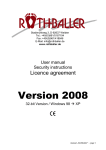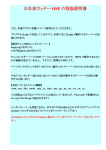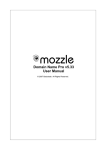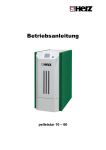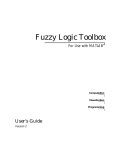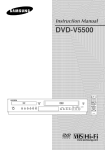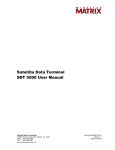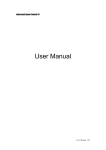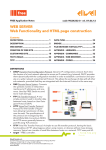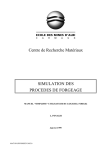Download SWITCH EPP Manual Version 2.1.2
Transcript
SWITCH, Werdstrasse 2, P.O. Box, CH-8021 Zürich www.nic.ch EPP Manual Version 2.1.2 – with DNSSEC and RGP November 7, 2013 SWITCH SWITCH, Werdstrasse 2, P.O. Box, CH-8021 Zürich www.nic.ch Contents 1 Management Summary ............................................................................................................................... 3 2 Introduction ................................................................................................................................................. 3 3 4 2.1 EPP standard + legal fundaments .................................................................................................. 4 2.2 Conditions of use ........................................................................................................................... 4 Using the EPP interface .............................................................................................................................. 6 3.1 Options offered by the EPP interface ............................................................................................. 6 3.2 SWITCH-specific general points .................................................................................................... 7 3.3 Session ended ............................................................................................................................... 8 EPP commands .......................................................................................................................................... 8 4.1 4.2 4.3 4.4 Protocol commands ....................................................................................................................... 9 4.1.1 login ................................................................................................................................... 9 4.1.2 logout ............................................................................................................................... 10 4.1.3 hello ................................................................................................................................. 11 4.1.4 poll ................................................................................................................................... 11 Domain commands ...................................................................................................................... 16 4.2.1 General information ......................................................................................................... 16 4.2.2 DNSSEC .......................................................................................................................... 17 4.2.3 domain:check .................................................................................................................. 18 4.2.4 domain:info ...................................................................................................................... 19 4.2.5 domain:create .................................................................................................................. 21 4.2.6 domain:delete .................................................................................................................. 22 4.2.7 domain:transfer................................................................................................................ 22 4.2.8 domain:update ................................................................................................................. 26 Contact commands ...................................................................................................................... 29 4.3.1 General information ......................................................................................................... 29 4.3.2 contact:check................................................................................................................... 30 4.3.3 contact:info ...................................................................................................................... 31 4.3.4 contact:create .................................................................................................................. 32 4.3.5 contact:delete .................................................................................................................. 33 4.3.6 contact:transfer ................................................................................................................ 34 4.3.7 contact:update ................................................................................................................. 34 Host commands ........................................................................................................................... 36 4.4.1 General information ......................................................................................................... 36 4.4.2 host:check ....................................................................................................................... 37 4.4.3 host:info ........................................................................................................................... 38 4.4.4 host:create ....................................................................................................................... 39 © SWITCH 2010. Subject to change. Page 2 / 49 SWITCH, Werdstrasse 2, P.O. Box, CH-8021 Zürich www.nic.ch 5 6 4.4.5 host:transfer..................................................................................................................... 39 4.4.6 host:delete ....................................................................................................................... 39 4.4.7 host:update ...................................................................................................................... 40 Testing ...................................................................................................................................................... 41 5.1 General information ...................................................................................................................... 41 5.2 Logging on ................................................................................................................................... 41 5.3 Test procedure ............................................................................................................................. 41 Further information .................................................................................................................................... 48 6.1 Appendix A Web interface for EPP users ........................................................................................................ 48 Abbreviations / Terms .............................................................................................................. 49 1 Management Summary The EPP Protocol (Extensible Provisioning Protocol) is an international standard for the administration of domain names. It allows the information that has to be exchanged between Partners and the registry operator to be sent via a secure and permanent connection. EPP allows Partners to integrate the administration of domain names in their existing system. This document contains all the information that is required for connecting up the Partner’s EPP client to the EPP Server at SWITCH. EPP has been implemented extensively according to the international standard; the SWITCH-specific deviations are specially marked. 2 Introduction SWITCH is the office responsible for the registration and administration of the country-code-Top-Level Domain Names (ccTLDs) for Switzerland (.ch) and Liechtenstein (.li). One of the main tasks this involves is the registration of second-level domain names under these ccTLDs, which will simply be referred to as “domain names” in what follows. © SWITCH 2010. Subject to change. Page 3 / 49 SWITCH, Werdstrasse 2, P.O. Box, CH-8021 Zürich www.nic.ch 2.1 EPP standard + legal fundaments This Manual is based on the following documents. Detailed examples of EPP commands are given in the RFCs listed below: Reference Document [01] RFC 5730: Extensible Provisioning Protocol (EPP) (http://www.ietf.org/rfc/rfc5730.txt) [02] RFC 5731: Extensible Provisioning Protocol (EPP) Domain Name Mapping (http://www.ietf.org/rfc/rfc5731.txt) [03] RFC 5732: Extensible Provisioning Protocol (EPP) Host Mapping (http://www.ietf.org/rfc/rfc5732.txt) [04] RFC 5733: Extensible Provisioning Protocol (EPP) Contact Mapping (http://www.ietf.org/rfc/rfc5733.txt) [05] RFC 5734: Extensible Provisioning Protocol (EPP) Transport Over TCP (http://www.ietf.org/rfc/rfc5734.txt) [06] SWITCH Partner Agreement, including Annexes [07] General Terms and Conditions (GTCs) for the registration and administration of domain names under “.ch” and “.li” The latest version is always available at www.nic.ch. [08] RFC 5910: Domain Name System (DNS) Security Extensions Mapping for the Extensible Provisioning Protocol (EPP) (http://www.ietf.org/rfc/rfc5910.txt) [09] RFC 3915: EPP Grace Period Mapping - Redemption Grace Period (RGP) (http://www.ietf.org/rfc/rfc3915.txt) [10] RFC 3735: Guidelines on extending EPP (http://www.ietf.org/rfc/rfc3915.txt) • This symbol denotes important SWITCH-specific technical deviations from the international EPP standard. The Partner Agreement and its Annexes always take precedence over this User Manual. 2.2 Conditions of use The following conditions must be fulfilled for regular operation of the EPP interface: © SWITCH 2010. Subject to change. Page 4 / 49 SWITCH, Werdstrasse 2, P.O. Box, CH-8021 Zürich www.nic.ch • • • A signed and valid Partner Agreement An IP address for your EPP client that has been activated by SWITCH A successfully completed test run (see Paragraph 5.3) © SWITCH 2010. Subject to change. Page 5 / 49 SWITCH, Werdstrasse 2, P.O. Box, CH-8021 Zürich www.nic.ch 3 Using the EPP interface An EPP client with a TLS connection is essential for using the EPP interface. Before a TLS connection can be established, the IP address of the EPP client must already have been activated by SWITCH. Once the TLS connection has been established, only the EPP commands of login and hello are permitted to begin with. All other EPP commands are only possible after a successful login. SWITCH does not offer a standard EPP client or an EPP library. Any EPP client can be used that satisfies the referenced standards as per Paragraph 2.1. In addition to the standard RFC, an EPP client must be configured in accordance with the provisions of this Manual and the Partner Agreement (including its Annexes). The EPP server supports the UTF-8 unicode character set (see Paragraph 3.2). Communication between the EPP client and the EPP server takes place by means of commands in XML format. The server will immediately send back the corresponding reply. Where there are several commands in succession (pipelining) these will be processed individually, waiting until the reply has been sent to the previous command in each case. 3.1 Options offered by the EPP interface The EPP interface has two main categories: objects and commands (actions). The objects are: • • • domain contact host The commands are divided up into protocol commands and object-specific commands. The following Table gives an overview of the protocol commands: Command Description hello Making contact login Logging onto the EPP server logout Logging off from the EPP server poll Retrieving messages from the poll queue on the EPP server – this is the route by which the EPP user receives notifications from SWITCH. © SWITCH 2010. Subject to change. Page 6 / 49 SWITCH, Werdstrasse 2, P.O. Box, CH-8021 Zürich www.nic.ch The following Table gives an overview of the object-specific commands: Object-specific commands domain contact Host check Checks the existence of an object ü ü ü info Supplies information on an object ü ü ü create Creates a new object ü ü ü delete Deletes an object ü ü ü renew Renews an object û - - transfer Transfers an object ü û (implicit) update Updates the data for an object ü ü ü ü û (implicit) implemented not implemented this command is not provided for in EPP. 3.2 SWITCH-specific general points Under the terms of Reference (01), all EPP commands are “atomic” and are either processed in full or rejected in full. If an EPP command is submitted twice, the second command will also be processed once again. If a domain name was already registered the first time the command was submitted, an error message will be issued the second time the same domain name is submitted. When requesting information on an object (contact, domain and host), the data authorised for publication by the Swiss Decree on Addressing Resources in the Telecommunications Sector (AEFV, Art. 14h) will be returned, unless the EPP user is authorised to see further information under the terms of the Partner Agreement, e.g. the expiry date of a domain name for the managing partner. © SWITCH 2010. Subject to change. Page 7 / 49 SWITCH, Werdstrasse 2, P.O. Box, CH-8021 Zürich www.nic.ch In general, any information that is not mandatory and is not used, which the EPP user submits, will be ignored. • A status allocated to objects by the EPP client is not supported, such as <clientDeleteProhibited>, <clientTransferProhibited> etc. • • Each partner is allowed to connect to the EPP server with maximally three sessions simultaneously. In general, the following UTF-8 characters are supported: • • • • • Basic Latin Latin-1 Supplement Latin Extended-A € euro sign U+0020 - U+007E U+00AE - U+00FF U+00A1 - U+00AC U+0100 - U+017F U+20AC Dates are given in local time, to the nearest second, stating the difference compared with UTC. For the example given for summer time below, UTC is thus 2007-09-18Z12:32:00. Format: Summer time: Winter time: yyyy-mm-ddThh:mi:ss+hh:mi (T instead of Z) 2007-09-18T14:32:00+02:00 2007-12-18T13:32:00+01:00 3.3 Session ended An EPP session can be ended by the server for the following reasons: • • • The EPP session has been inactive for more than 3 hours (“session-timeout”) The maximum number of unsuccessful EPP commands has been reached Scheduled or non-scheduled maintenance work on the EPP server 4 EPP commands Each Partner has a maximum number of EPP commands per minute available to them. On average utilisation, this is 100 EPP commands per minute. Depending on the load on the registration system, SWITCH may dynamically modify this rate. Once the maximum number of commands per minute has been achieved, the server will delay accepting any further EPP requests. © SWITCH 2010. Subject to change. Page 8 / 49 SWITCH, Werdstrasse 2, P.O. Box, CH-8021 Zürich www.nic.ch 4.1 Protocol commands In addition to what is set out below, the protocol commands are described in detail in Reference (1). 4.1.1 login An EPP session is set up by means of a) a TLS connection to the EPP server and b) a subsequent successful login with the EPP login command The EPP server acknowledges the successful establishment of the TLS connection with a greeting. After the connection has been set up, the client still has to sign on with the login command. The EPP server then sends an EPP response. Code 1000 means that the EPP session has been successfully established. After a successful login the EPP response will say how many messages are waiting in the poll queue and what the first message is about. Until the EPP client has sent a login, only hello is supported. The EPP login password can also be altered at the same time as the login command is submitted: <pw>old-password</pw> <newPW>new-password</newPW> The EPP login password must be 10 - 16 characters in length. Particular attention should be paid to the provisions of the GTCs when it comes to the careful selection of passwords and to keeping passwords safe and confidential. Example of a login command <?xml version="1.0" encoding="UTF-8" standalone="no"?> <epp xmlns="urn:ietf:params:xml:ns:epp-1.0"> <command> <login> <clID>YOUR-CLID</clID> <pw>ABCDEF</pw> <options> <version>1.0</version> <lang>en</lang> </options> <svcs> <objURI>urn:ietf:params:xml:ns:domain-1.0</objURI> <objURI>urn:ietf:params:xml:ns:contact-1.0</objURI> <objURI>urn:ietf:params:xml:ns:host-1.0</objURI> </svcs> </login> <clTRID>ABC.1</clTRID> </command> </epp> DNSSEC Extension svcExtension> <extURI>urn:ietf:params:xml:ns:secDNS-1.1</extURI> </svcExtension> RGP Zusatz <svcExtension> <extURI>urn:ietf:params:xml:ns:rgp-1.0 </extURI> </svcExtension> © SWITCH 2010. Subject to change. Page 9 / 49 SWITCH, Werdstrasse 2, P.O. Box, CH-8021 Zürich www.nic.ch Example of a login response <?xml version="1.0" encoding="UTF-8"?> <epp xmlns="urn:ietf:params:xml:ns:epp-1.0"> <response> <result code="1000"> <msg lang="en">Command completed successfully</msg> </result> <msgQ count="1" id="1139047"> <qDate>2007-09-26T00:00:00+02:00</qDate> <msg>Domain transfercode</msg> </msgQ> <trID> <clTRID>ABC.1</clTRID> <svTRID>20071008.13747.27297</svTRID> </trID> </response> </epp> TEST PARTNER A has an unacknowledged message in the poll queue. • • • • The EPP server epp.nic.ch is accessed with a TLS connection via Port 700. The EPP server only allows connections from clients whose IP addresses are registered at SWITCH. Only DNSSEC-1.1 is supported In using DNSSEC extensions, it is required that the partner has been DNSSEC enabled. Otherwise, he will receive an error message after login. 4.1.2 logout The EPP client must end its session with the logout command. Example of a logout command <?xml version="1.0" encoding="UTF-8" standalone="no"?> <epp xmlns="urn:ietf:params:xml:ns:epp-1.0"> <epp:command xmlns:epp="urn:ietf:params:xml:ns:epp-1.0"> <epp:logout /> <epp:clTRID>ABC.27</epp:clTRID> </epp:command> </epp> Example of a logout response <?xml version="1.0" encoding="UTF-8"?> <epp xmlns="urn:ietf:params:xml:ns:epp-1.0"> <response> <result code="1500"> <msg lang="en">Command completed successfully; ending session</msg> </result> <trID> <clTRID>ABC.27</clTRID> <svTRID>20071008.13747.27299</svTRID> </trID> </response> </epp> © SWITCH 2010. Subject to change. Page 10 / 49 SWITCH, Werdstrasse 2, P.O. Box, CH-8021 Zürich www.nic.ch 4.1.3 hello The EPP client can use the hello command to see whether the EPP session is still active. This command can also be used to prevent the session from being ended because it has been inactive for too long. The EPP server answers a hello command with the greeting. Example of a hello command <?xml version="1.0" encoding="UTF-8" standalone="no"?> <epp xmlns="urn:ietf:params:xml:ns:epp-1.0"> <hello/> </epp> Example of a hello response (greeting) <?xml version="1.0" encoding="UTF-8"?> <epp xmlns="urn:ietf:params:xml:ns:epp-1.0"> <greeting> <svID>SWITCH_EPP_Server</svID> <svDate>2007-10-09T08:44:14+02:00</svDate> <svcMenu> <version>1.0</version> <lang>en</lang> <objURI>urn:ietf:params:xml:ns:domain-1.0</objURI> <objURI>urn:ietf:params:xml:ns:contact-1.0</objURI> <objURI>urn:ietf:params:xml:ns:host-1.0</objURI> <svcExtension> <extURI>urn:ietf:params:xml:ns:secDNS-1.1</extURI> </svcExtension> </svcMenu> <dcp> <access> <personalAndOther /> </access> <statement> <purpose> <admin /> <other /> <prov /> </purpose> <recipient> <ours /> <public /> </recipient> <retention> <legal /> </retention> </statement> </dcp> </greeting> </epp> 4.1.4 poll The messages in the poll queue must be retrieved one after the other and acknowledged. As soon as the first message has been acknowledged, the second one can be retrieved, etc. Messages that have been acknowledged are deleted from the poll queue. © SWITCH 2010. Subject to change. Page 11 / 49 SWITCH, Werdstrasse 2, P.O. Box, CH-8021 Zürich www.nic.ch Example of a poll command for retrieving a message <epp xmlns="urn:ietf:params:xml:ns:epp-1.0"> <command> <poll op="req"/> <clTRID>Partner_00_2</clTRID> </command> </epp> The possible answers can be seen in Paragraphs 4.1.4.1 to 4.1.4.3. Example of a poll command for confirming a message <?xml version="1.0" encoding="UTF-8" standalone="no"?> <epp xmlns="urn:ietf:params:xml:ns:epp-1.0"> <command> <poll op="ack" msgID="1139047"/> <clTRID>Partner_00_3</clTRID> </command> </epp> Example of a poll response for confirming a message <?xml version="1.0" encoding="UTF-8"?> <epp xmlns="urn:ietf:params:xml:ns:epp-1.0"> <response> <result code="1000"> <msg lang="en">Command completed successfully</msg> </result> <msgQ count="0" id="1139047"/> <trID> <clTRID>Partner_00_3</clTRID> <svTRID>20071008.13689.27043</svTRID> </trID> </response> </epp> 4.1.4.1 Domain Transfer Completed message This message is put in the poll queue of the Partner to date once a domain transfer has been completed. Attribute Comment domain:name Domain name domain:trstatus “ServerApproved” domain:reID contact:id of the requester domain:reDate Date of request domain:acID “ZERO” domain:acDate Execution date domain:exDate This is omitted. © SWITCH 2010. Subject to change. Page 12 / 49 SWITCH, Werdstrasse 2, P.O. Box, CH-8021 Zürich www.nic.ch Example of a poll response after successful transfer <?xml version="1.0" encoding="UTF-8"?> <epp xmlns="urn:ietf:params:xml:ns:epp-1.0"> <response> <result code="1301"> <msg lang="en">Command completed successfully; ack to dequeue</msg> </result> <msgQ count="1" id="1139047"> <qDate>2007-09-26T00:00:00+02:00</qDate> <msg> Domain transfer completed successfully</msg> </msgQ> <epp:resData xmlns:epp="urn:ietf:params:xml:ns:epp-1.0"> <domain:trnData xmlns:domain="urn:ietf:params:xml:ns:domain-1.0"> <domain:name>yourname.ch</domain:name> <domain:trStatus>ServerApproved</domain:trStatus> <domain:reID>PartnerB</domain:reID> <domain:reDate>2007-09-18T22:43:00+02:00</domain:reDate> <domain:acID>NULL</domain:acID> <domain:acDate>2007-09-18T22:43:00+02:00</domain:acDate> </domain:trnData> </epp:resData> <trID> <clTRID>Partner_00_2</clTRID> <svTRID>20071008.13688.27039</svTRID> </trID> </response> </epp> 4.1.4.2 Transfercode Send message This message is placed in the poll queue of the future Partner in the case of a bulk Partner transfer. The Partner carries out the transfer themselves with the transfer code contained in the message. Attribute Comment domain:name Domain name domain:roid Dnnnnnnnn-SWITCH domain:clID contact:id of current Partner domain:authinfo Transfer code © SWITCH 2010. Subject to change. Page 13 / 49 SWITCH, Werdstrasse 2, P.O. Box, CH-8021 Zürich www.nic.ch Example of a poll response <?xml version="1.0" encoding="UTF-8"?> <epp xmlns="urn:ietf:params:xml:ns:epp-1.0"> <response> <result code="1301"> <msg lang="en">Command completed successfully; ack to dequeue</msg> </result> <msgQ count="1" id="1139047"> <qDate>2007-09-26T00:00:00+02:00</qDate> <msg>Domain transfercode</msg> </msgQ> <epp:resData xmlns:epp="urn:ietf:params:xml:ns:epp-1.0"> <domain:infData xmlns:domain="urn:ietf:params:xml:ns:domain-1.0"> <domain:name>test-partner-a-domain-1.ch</domain:name> <domain:roid>D1234567-SWITCH</domain:roid> <domain:clID>SWITCH-PARTNER</domain:clID> <domain:authInfo> <domain:pw>the-domain-tranfercode</domain:pw> </domain:authInfo> </domain:infData> </epp:resData> <trID> <clTRID>Partner_00_2</clTRID> <svTRID>20071008.13688.27039</svTRID> </trID> </response> </epp> 4.1.4.3 Transfercode Reject message This message is placed in the future Partner’s poll queue for a bulk Partner transfer if the holder has rejected a transfer. Attribute Comment domain:name Domain name domain:roid Dnnnnnnnn-SWITCH domain:clID contact:id of the current Partner © SWITCH 2010. Subject to change. Page 14 / 49 SWITCH, Werdstrasse 2, P.O. Box, CH-8021 Zürich www.nic.ch Example of a bulk transfer code reject message <?xml version="1.0" encoding="UTF-8"?> <epp xmlns="urn:ietf:params:xml:ns:epp-1.0"> <response> <result code="1301"> <msg>Command completed successfully; ack to dequeue</msg> </result> <msgQ count="1" id="1139047"> <qDate>2007-09-26T00:00:00+02:00</qDate> <msg>Domain transfer rejected</msg> </msgQ> <resData> <domain:infData> <domain:name>yourname.ch</domain:name> <domain:roid>D12345678-SWITCH</domain:roid> <domain:clID>SWITCH-PARTNER</domain:clID> </domain:infData> </resData> <trID> <clTRID>Partner_00_2</clTRID> <svTRID>20071008.13688.27039</svTRID> </trID> </response> </epp> © SWITCH 2010. Subject to change. Page 15 / 49 SWITCH, Werdstrasse 2, P.O. Box, CH-8021 Zürich www.nic.ch 4.2 Domain commands 4.2.1 General information In addition to what is set out below, the domain commands are described in detail in Reference (1). • The holder of a domain name is saved in the domain:registrant box. • The domain name transfer code may only be given to the holder of the domain name. • Mention is made of a renew command in the EPP specification. This is not implemented, since a renew is performed by the server. A renew is rejected with error code 2101 (“unimplemented command”). • Each domain name can be optionally allocated a maximum of one type="tech" contact. Domain attribute M U whois name Y N Y roid Y N N status N N N registrant Y Y Y contact:id contact type=tech N Y Y contact:id hostObj N Y Y clID Y N N crID Comment Dnnnnnnnn-SWITCH, supplied by the registry Set by the registry This is omitted. crDate N N Set by the registry exDate N N Set by the registry upID This is omitted. upDate N N This is omitted. trDate N N N This is omitted. authinfo N Y N Blank spaces “;” and “,” are not permitted. M = Mandatory U = Update possible Y = Yes N = No © SWITCH 2010. Subject to change. Page 16 / 49 SWITCH, Werdstrasse 2, P.O. Box, CH-8021 Zürich www.nic.ch 4.2.2 DNSSEC DNSSEC can be used on an optional basis and is deployed for signing domain names. DNSSEC Attribut M Comment alg Y algorithm (actually 3, 5, 6, 7, 8, 10, 12, 13, 14) digestType Y 1, 2, 3 or 4 digest Y max. 128 characters flags N 256 or 257 protocol N 3 keyTag Y 0-65535 value range pubKey N max. 1024 characters M = Mandatory • • • • • • Y = Yes N = No Before a Partner can use DNSSEC, it must have been activated for this Partner beforehand. DNSSEC has to be declared at login: urn:ietf:params:xml:ns:secDNS-1.1 SWITCH does not make delegation checks and does not check if signed domain names are accessible. keyData entries are optional and will be saved in the database if sent. If keyData is used, the flags, protocol, alg and pubKey attributes are mandatory. 1.1 only DS-Data Interface is supported 4.2.3 RGP RGP can be used on an optional basis to delete restored domain names. • • • • • RGP must be declared when logging in: urn:ietf:params:xml:ns:rgp-1.0 If the domain name belongs to the partner submitting the query, the command domain:info can be used to enquire whether the domain name is within the redemption period There is no pendingRestore RGP status. If the restore command has been successful, then the EPP status of the domain name will switch to "OK". The optional rgp:report element in the rgp:restore element is ignored. A separate rgp:report command leads to an error, since there is no pendingRestore. © SWITCH 2010. Subject to change. Page 17 / 49 SWITCH, Werdstrasse 2, P.O. Box, CH-8021 Zürich www.nic.ch 4.2.4 domain:check Using domain:check it is possible to check whether domain names exist. The server will reply with registered / not registered. Bulk queries are only permitted to a limited extent, as per Reference (06). • A maximum of 10 domain names can be queried at a time in an individual command, otherwise the server will answer with error code 2308 (“Data management policy violation”) Example of a domain check command <?xml version="1.0" encoding="UTF-8" standalone="no"?> <epp xmlns="urn:ietf:params:xml:ns:epp-1.0"> <command> <check> <domain:check xmlns:domain="urn:ietf:params:xml:ns:domain-1.0"> <domain:name>yourname.ch</domain:name> <domain:name>yourname.li</domain:name> <domain:name>studen-be.ch</domain:name> <domain:name>fuerstentum.li</domain:name> </domain:check> </check> <clTRID>ABC-12345</clTRID> </command> </epp> Example of a domain check response <epp xmlns="urn:ietf:params:xml:ns:epp-1.0"> <response> <result code="1000"> <msg lang="en">Command completed successfully</msg> </result> <resData> <domain:chkData xmlns:domain="urn:ietf:params:xml:ns:domain-1.0"> <domain:cd> <domain:name avail="0">yourname.ch</domain:name> <domain:reason>In use</domain:reason> </domain:cd> <domain:cd> <domain:name avail="1">yourname.li</domain:name> </domain:cd> <domain:cd> <domain:name avail="0">studen-be.ch</domain:name> <domain:reason>City-domainname</domain:reason> </domain:cd> <domain:cd> <domain:name avail="0">fuerstentum.li</domain:name> <domain:reason>Legal reasons</domain:reason> </domain:cd> </domain:chkData> </resData> <trID> <clTRID>ABC-12345</clTRID> <svTRID>20071009.14301.29655</svTRID> </trID> </response> </epp> © SWITCH 2010. Subject to change. Page 18 / 49 SWITCH, Werdstrasse 2, P.O. Box, CH-8021 Zürich www.nic.ch 4.2.5 domain:info The domain:info command is used to have the data for the domain name disclosed with (see Paragraph 3.2). In addition to the standard data, the <domain:clID> box contains the ID of the “sponsoring client”, i.e. the current Partner’s ID. Bulk queries are only permitted within the scope and for the purpose set out in Reference (06). The <domain:status>, <domain:exDate> and <domain:authInfo> boxes are only disclosed for domain names administered by the Partner who has submitted the query. Example of a domain info command <?xml version="1.0" encoding="UTF-8" standalone="no"?> <epp xmlns="urn:ietf:params:xml:ns:epp-1.0"> <command> <info> <domain:info xmlns:domain="urn:ietf:params:xml:ns:domain-1.0"> <domain:name>yourname.ch</domain:name> </domain:info> </info> <clTRID>ABC-12345</clTRID> </command> </epp> Example of a domain info response <?xml version="1.0" encoding="UTF-8"?> <epp xmlns="urn:ietf:params:xml:ns:epp-1.0"> <response> <result code="1000"> <msg lang="en">Command completed successfully</msg> </result> <resData> <domain:infData xmlns:domain="urn:ietf:params:xml:ns: domain-1.0"> <domain:name>yourname.ch</domain:name> <domain:roid>D2586061-SWITCH</domain:roid> <domain:status s="ok"/> <domain:registrant>5527981</domain:registrant> <domain:contact type="tech">5527981</domain:contact> <domain:ns> <domain:hostObj>ns1.yourname.ch</domain:hostObj> <domain:hostObj>ns2.yourname.ch</domain:hostObj> </domain:ns> <domain:clID>3703709</domain:clID> <domain:exDate>2009-01-31T00:00:00+01:00 </domain:exDate> <domain:authInfo> <domain:pw>foo#Bar%</domain:pw> </domain:authInfo> </domain:infData> </resData> <trID> <clTRID>ABC-12345</clTRID> <svTRID>20080529.27664.913190</svTRID> </trID> </response> </epp> For DNSSEC signed domain names <extension> <secDNS:infData xmlns:secDNS="urn:ietf:params:xml:ns:secDNS-1.1"> <dsData xmlns="urn:ietf:params:xml:ns:secDNS-1.1"> <keyTag>43837</keyTag> <alg>5</alg> <digestType>2</digestType> <digest>838C3D0966B9EE55</digest> <keyData> <flags>257</flags> <protocol>3</protocol> <alg>5</alg> <pubKey>TH3PUBL1CK3Y</pubKey> </keyData> </dsData> </secDNS:infData> </extension> Query about a domain name administered by the Partner who is submitting the query. © SWITCH 2010. Subject to change. Page 19 / 49 SWITCH, Werdstrasse 2, P.O. Box, CH-8021 Zürich www.nic.ch Example of a domain info response with "redemptionPeriod" status <?xml version="1.0" encoding="UTF-8"?> <epp xmlns="urn:ietf:params:xml:ns:epp-1.0"> <response> <result code="1000"> <msg lang="en">Command completed successfully</msg> </result> <resData> <domain:infData xmlns:domain="urn:ietf:params:xml:ns: domain-1.0"> <domain:name>yourname.ch</domain:name> <domain:roid>D2586061-SWITCH</domain:roid> <domain:status s="pendingDelete"/> <domain:registrant>5527981</domain:registrant> <domain:contact type="tech">5527981</domain:contact> <domain:ns> <domain:hostObj>ns1.yourname.ch</domain:hostObj> <domain:hostObj>ns2.yourname.ch</domain:hostObj> </domain:ns> <domain:clID>3703709</domain:clID> <domain:exDate>2009-01-31T00:00:00+01:00 </domain:exDate> <domain:authInfo> <domain:pw>foo#Bar%</domain:pw> </domain:authInfo> </domain:infData> </resData> <extension> <rgp:infData xmlns:rgp="urn:ietf:params:xml:ns:rgp-1.0" xsi:schemaLocation="urn:ietf:params:xml:ns:rgp-1.0 rgp-1.0.xsd"> <rgp:rgpStatus s="redemptionPeriod"/> </rgp:infData> </extension> <trID> <clTRID>ABC-12345</clTRID> <svTRID>20080529.27664.913190</svTRID> </trID> </response> </epp> Query about a domain name administered by the Partner who is submitting the query. © SWITCH 2010. Subject to change. Page 20 / 49 SWITCH, Werdstrasse 2, P.O. Box, CH-8021 Zürich www.nic.ch 4.2.6 domain:create domain:create is used to register domain names. Prior to this, all the contacts (the holder and the technical contact) must have been entered if they do not already exist. Name servers must also be registered beforehand so that they can be allocated to the domain name. • • <admin> not supported. <billing> not supported (the Partner is always the billing contact). Example of a domain create command <?xml version="1.0" encoding="UTF-8" standalone="no"?> <epp xmlns="urn:ietf:params:xml:ns:epp-1.0"> <command> <create> <domain:create xmlns:domain="urn:ietf:params:xml:ns: domain-1.0"> <domain:name>yourname.ch</domain:name> <domain:ns> <domain:hostObj>ns1.yourname.ch</domain:hostObj> <domain:hostObj>ns2.yourname.ch</domain:hostObj> </domain:ns> <domain:registrant>HOLDERCONTACT</domain:registrant> <domain:contact type="tech">TECHCONTACT</domain:contact> <domain:authInfo> <domain:pw/> </domain:authInfo> </domain:create> </create> <clTRID>ABC-12345</clTRID> </command> </epp> DNSSEC Extension <extension> <secDNS:create xmlns:secDNS="urn:ietf:params:xml:ns:secDNS-1.1"> <secDNS:dsData> <secDNS:keyTag>12345</secDNS:keyTag> <secDNS:alg>3</secDNS:alg> <secDNS:digestType>1</secDNS:digestType> <secDNS:digest>49FD46E6C4B45C55</secDNS:digest> <secDNS:keyData> <secDNS:flags>256</secDNS:flags> <secDNS:protocol>3</secDNS:protocol> <secDNS:alg>3</secDNS:alg> <secDNS:pubKey>TH3PUBL1CK3Y</secDNS:pubKey> </secDNS:keyData> </secDNS:dsData> </secDNS:create> </extension> keyData is optional. If sent, the calculation of the pubKey has to lead to the digest. Example of a domain create response <epp xmlns="urn:ietf:params:xml:ns:epp-1.0"> <response> <result code="1000"> <msg lang="en">Command completed successfully</msg> </result> <resData> <domain:creData xmlns:domain="urn:ietf:params:xml:ns:domain-1.0"> <domain:name>yourname.ch</domain:name> <domain:crDate>1999-04-03T22:00:00.0Z</domain:crDate> <domain:exDate>2001-04-03T22:00:00.0Z</domain:exDate> </domain:creData> </resData> <trID> <clTRID>ABC-12345</clTRID> <svTRID>54321-XYZ</svTRID> </trID> </response> </epp> © SWITCH 2010. Subject to change. Page 21 / 49 SWITCH, Werdstrasse 2, P.O. Box, CH-8021 Zürich www.nic.ch 4.2.7 domain:delete domain:delete is used to delete domain names with immediate effect. A domain name can be deleted by the authorised Partner at any time, observing the rules in Reference (06). A deleted domain name can only be re-registered after the transition period as per Reference (07). • Transferring domain names to other holders: The current partner deletes the domain name with domain:delete and then registers it again immediately for a different person or organisation with domain:create. No other Partner or direct customer is able to register this domain name during the transition period. Transferring domain names with domain:update is prohibited on legal grounds. • A domain name can be deleted even if subordinate name servers (subordinate hosts) are available. These continue to be registered but can no longer be used (see Paragraph 4.4). Example of a domain delete command <?xml version="1.0" encoding="UTF-8" standalone="no"?> <epp xmlns="urn:ietf:params:xml:ns:epp-1.0"> <command> <delete> <domain:delete xmlns:domain="urn:ietf:params:xml:ns:domain-1.0"> <domain:name>yourname.ch</domain:name> </domain:delete> </delete> <clTRID>ABC-12345</clTRID> </command> </epp> Example of a domain delete response <epp xmlns="urn:ietf:params:xml:ns:epp-1.0"> <response> <result code="1000"> <msg lang="en">Command completed successfully</msg> </result> <trID> <clTRID>ABC-12345</clTRID> <svTRID>54321-XYZ</svTRID> </trID> </response> </epp> 4.2.8 domain:transfer The holder can have their domain name administered by a Partner of their choice or by SWITCH. The domain:transfer command is used to transfer domain names. If subordinate name servers are available for a domain name that is to be transferred, then these will similarly be transferred. © SWITCH 2010. Subject to change. Page 22 / 49 SWITCH, Werdstrasse 2, P.O. Box, CH-8021 Zürich www.nic.ch Registrant Future Registrar Registry Current Registrar 1.transfer request with password 2.transfer request with authinfo 3.perform request 4.command response 5.put message for current registrar 6.command response 7.poll The complete domain transfer process in seven steps: 1. transfer request with password The holder must request a transfer code for their domain name from their current Partner (if the holder is with SWITCH, they can order their transfer code themselves via their web interface). As soon as they have obtained the transfer code, they can forward it to the new Partner. 2. transfer request with authinfo The new Partner sends the domain:transfer request, with the corresponding transfer code to SWITCH, via EPP. © SWITCH 2010. Subject to change. Page 23 / 49 SWITCH, Werdstrasse 2, P.O. Box, CH-8021 Zürich www.nic.ch 3. perform request The EPP server checks the request and transfers the domain name if the transfer code is correct. Any subordinate name servers will similarly be transferred (see Paragraph 4.4.1). After the transfer, the domain name comes under the new Partner’s domain name portfolio. The contact IDs are not supplied with a transfer and need to be replaced with contact IDs created by the new Partner. The new Partner must use domain:update to enter a contact ID that they have created for the holder (a technical contact is not mandatory), before further updates are permitted for the domain name. Until this has been done, check, info, delete and transfer are the only valid commands. If there is a holder change at the same time (transfer of a domain name to another holder), it must be performed in subject to the regulations of Paragraph 4.2.5 and the Partner is not allowed to make changes of the holder in the existing contact ID. 4. command response The EPP server sends the new Partner a confirmation message (EPP response). 5. put message for current registrar SWITCH puts a new message in the poll queue for the Partner to date, confirming the transfer of the domain name to a new Partner or to SWITCH. 6. command response The new Partner can inform the holder that the transfer has been completed. SWITCH does not generally make contact with the holder as long as the holder is with a Partner, except in the cases mentioned in Reference (06). 7. poll The Partner to date can retrieve the message generated under Number 5 above from their poll queue. • After a successful transfer, the status <serverTransferProhibited> is assigned. While the domain name has this status, it cannot be transferred to another Partner. This status lasts 60 days and is then automatically removed. • The Transfer Query command is not required, since the transfer will be carried out immediately if the transfer code is valid. The server will respond to a Transfer Query command with error code 2101 (“Unimplemented command”). • In the case of a bulk Partner transfer from SWITCH to a Partner who uses EPP, the transfer codes will be put in the Partner’s poll queue. • Transferring a DNSSEC signed domain name to a partner who is not using DNSSEC is not possible. In such case, DNSSEC has to be deactivated first. © SWITCH 2010. Subject to change. Page 24 / 49 SWITCH, Werdstrasse 2, P.O. Box, CH-8021 Zürich www.nic.ch Example of a domain transfer command <?xml version="1.0" encoding="UTF-8" standalone="no"?> <epp xmlns="urn:ietf:params:xml:ns:epp-1.0"> <command> <transfer op="request"> <domain:transfer xmlns:domain="urn:ietf:params:xml:ns:domain-1.0"> <domain:name>yourname.ch</domain:name> <domain:authInfo> <domain:pw>ABCDEF</domain:pw> </domain:authInfo> </domain:transfer> </transfer> <clTRID>ABC-12345</clTRID> </command> </epp> Example of a domain transfer response <epp xmlns="urn:ietf:params:xml:ns:epp-1.0"> <response> <result code="1000"> <msg lang="en">Command completed successfully</msg> </result> <resData> <domain:trnData xmlns:domain="urn:ietf:params:xml:ns:domain-1.0"> <domain:name>yourname.ch</domain:name> <domain:trStatus>serverApproved</domain:trStatus> <domain:reID>TEST-PARTNER-A</domain:reID> <domain:reDate>2007-12-06T16:23:52+01:00</domain:reDate> <domain:acID>TEST-PARTNER-A</domain:acID> <domain:acDate>2007-12-06T16:23:52+01:00</domain:acDate> </domain:trnData> </resData> <trID> <clTRID>ABC-12345</clTRID> <svTRID>20071206.91098.282082</svTRID> </trID> </response> </epp> © SWITCH 2010. Subject to change. Page 25 / 49 SWITCH, Werdstrasse 2, P.O. Box, CH-8021 Zürich www.nic.ch 4.2.9 domain:update Updates are made to the domain name with domain:update. This command can also be used to generate the transfer code (<domain:authInfo>), which is then forwarded to the holder so that the domain name can be transferred. If the domain:update command does not change any entries in the boxes, error code 2308 (“Data management policy violation”) will be returned. If SWITCH contact IDs are registered at the time the domain:update command is submitted (because a transfer has taken place beforehand), the Partner must enter their own contact IDs with domain:update. If only the contact ID for the holder is replaced, the technical contact remains empty. Any technical contact in the box will be deleted. • • <admin> and <billing> are ignored <domain:authInfo>: the transfer code must comply with the following rules: • • • 6 – 60 characters (character sets as per Paragraph 3.2) No blank spaces, commas or semicolons Transferring domain names to other holders: the direct transfer of a domain name by updating the holder is prohibited on legal grounds. It is, however, possible for a domain name to be deleted and then registered again by the same Partner for another person or organisation (see Paragraph 4.2.5). The transition period as per Reference (6) ensures that the domain name cannot be registered by any other Partners or end customers. The partner must perform the registration for the new holder straightaway. © SWITCH 2010. Subject to change. Page 26 / 49 SWITCH, Werdstrasse 2, P.O. Box, CH-8021 Zürich www.nic.ch Example of a domain update command <?xml version="1.0" encoding="UTF-8" standalone="no"?> <epp xmlns="urn:ietf:params:xml:ns:epp-1.0"> <command> <update> <domain:update xmlns:domain="urn:ietf:params:xml:ns:domain-1.0"> <domain:name>yourname.ch</domain:name> <domain:add> <domain:ns> <domain:hostObj>ns.yourns.ch</domain:hostObj> </domain:ns> <domain:contact type="tech">NEWTECHCONTACT</domain:contact> </domain:add> <domain:rem> <domain:contact type="tech">OLDTECHCONTACT</domain:contact> </domain:rem> <domain:chg> <domain:authInfo> <domain:pw>2BARfoo</domain:pw> </domain:authInfo> </domain:chg> </domain:update> </update> <clTRID>Test3</clTRID> </command> </epp> DNSSEC Estension adding DNSSEC data: <extension> <secDNS:update xmlns:secDNS="urn:ietf:params:xml:ns:secDNS-1.1"> <secDNS:add> <secDNS:dsData> <secDNS:keyTag>12346</secDNS:keyTag> <secDNS:alg>3</secDNS:alg> <secDNS:digestType>1</secDNS:digestType> <secDNS:digest>38EC35D5B3A34B44C39B</secDNS:digest> </secDNS:dsData> </secDNS:add> </secDNS:update> </extension> replace DNSSEC data (all existing DS records will be replaced): <extension> <secDNS:update xmlns:secDNS="urn:ietf:params:xml:ns:secDNS-1.1"> <secDNS:rem> <secDNS:all>true</secDNS:all> </secDNS:rem> <secDNS:add> <secDNS:dsData> <secDNS:keyTag>12346</secDNS:keyTag> <secDNS:alg>3</secDNS:alg> <secDNS:digestType>1</secDNS:digestType> <secDNS:digest>38EC35D5B3A34B44C39B</secDNS:digest> </secDNS:dsData> </secDNS:add> </secDNS:update> </extension> remove DNSSEC data (all DS records that contain enclosed attributes will be deleted): <extension> <secDNS:update xmlns:secDNS="urn:ietf:params:xml:ns:secDNS-1.1"> <secDNS:rem> <secDNS:dsData> <secDNS:keyTag>12346</secDNS:keyTag> <secDNS:alg>3</secDNS:alg> <secDNS:digestType>1</secDNS:digestType> <secDNS:digest>38EC35D5B3A34B44C39B</secDNS:digest> </secDNS:dsData> </secDNS:rem> </secDNS:update> </extension> © SWITCH 2010. Subject to change. Page 27 / 49 SWITCH, Werdstrasse 2, P.O. Box, CH-8021 Zürich www.nic.ch Example of a domain update command with an RGP restore request <?xml version="1.0" encoding="UTF-8" standalone="no"?> <epp xmlns="urn:ietf:params:xml:ns:epp-1.0"> <command> <update> <domain:update xmlns:domain="urn:ietf:params:xml:ns:domain-1.0"> <domain:name>yourname.ch</domain:name> <domain:chg/> </domain:update> </update> <extension> <rgp:update xmlns:rgp="urn:ietf:params:xml:ns:rgp-1.0" xsi:schemaLocation="urn:ietf:params:xml:ns:rgp-1.0 rgp-1.0.xsd"> <rgp:restore op="request"/> </rgp:update> </extension> <clTRID>Test3</clTRID> </command> </epp> Example of a domain update response <?xml version="1.0" encoding="UTF-8"?> <epp xmlns="urn:ietf:params:xml:ns:epp-1.0"> <response> <result code="1000"> <msg lang="en">Command completed successfully</msg> </result> <trID> <clTRID>Test3</clTRID> <svTRID>20071207.92654.285546</svTRID> </trID> </response> </epp> © SWITCH 2010. Subject to change. Page 28 / 49 SWITCH, Werdstrasse 2, P.O. Box, CH-8021 Zürich www.nic.ch 4.3 Contact commands 4.3.1 General information In addition to what is set out below, the contact commands are described in detail in Reference (3). Only the data permitted by law is published (see Paragraph 3.2). The way in which access to other data and data updating is handled is governed by Reference (06 Contact attribute M U Whois Comment Id Y N N Server-unique id, ASCII-upper-case letters, numbers and ”-“, supplied by the registrar Roid Y N N Cnnnnnnnn-SWITCH, supplied by the registry Status Y N N Linked, ok, serverDeleteProhibited, serverUpdateProhibited name type=”loc” Y Y Y Last name First name org type=“loc“ N Y Y Street Y Y Y Street N Y Y Street N Y N City Y Y Y Maximum Length: 30 signs Sp N Y N Canton, Federal State, Country Pc N Y Y Cc Y Y Y Voice N Y N Fax N Y N email Y Y N clID Y N N Set by the registry crID N N Set by the registry crDate N N Set by the registry upID N N This is omitted. © SWITCH 2010. Subject to change. ISO.3166.1997 Page 29 / 49 SWITCH, Werdstrasse 2, P.O. Box, CH-8021 Zürich www.nic.ch Contact attribute M U whois Comment upDate N N This is omitted. trDate N N This is omitted. authinfo This is ignored. ”not supported“ Disclose Error 2308 M = Mandatory U = Update possible Y = Yes N = No 4.3.2 contact:check The contact:check command can be used to check whether contacts actually exist. The server replies with registered / not registered. Bulk queries are permitted as per Reference (06) for the purpose specified there and after consultation with SWITCH. Example of a contact check command <?xml version="1.0" encoding="UTF-8" standalone="no"?> <epp xmlns="urn:ietf:params:xml:ns:epp-1.0"> <command> <check> <contact:check xmlns:contact="urn:ietf:params:xml:ns:contact-1.0"> <contact:id>AVAILABLE-CONTACT-ID</contact:id> <contact:id>NOT-AVAILABLE-CONTACT-ID</contact:id> </contact:check> </check> <clTRID>ABC-12345</clTRID> </command> </epp> Example of a contact check response <?xml version="1.0" encoding="UTF-8"?> <epp xmlns="urn:ietf:params:xml:ns:epp-1.0"> <response> <result code="1000"> <msg lang="en">Command completed successfully</msg> </result> <resData> <contact:chkData xmlns:contact="urn:ietf:params:xml:ns:contact-1.0"> <contact:cd> <contact:id avail="1">AVAILABLE-CONTACT-ID</contact:id> </contact:cd> <contact:cd> <contact:id avail="0">NOT-AVAILABLE-CONTACT-ID</contact:id> <contact:reason>In use</contact:reason> </contact:cd> </contact:chkData> </resData> <trID> <clTRID>ABC-12345</clTRID> <svTRID>20071207.92655.285552</svTRID> </trID> </response> </epp> © SWITCH 2010. Subject to change. Page 30 / 49 SWITCH, Werdstrasse 2, P.O. Box, CH-8021 Zürich www.nic.ch 4.3.3 contact:info The contact:info command is used to request information on contacts. The <contact:email> box is only disclosed for contacts administered by the Partner who has submitted the query. “Not supported” is always returned for Contact password. Example of a contact info command <?xml version="1.0" encoding="UTF-8" standalone="no"?> <epp xmlns="urn:ietf:params:xml:ns:epp-1.0"> <command> <info> <contact:info xmlns:contact="urn:ietf:params:xml:ns:contact-1.0"> <contact:id>TEST-PARTNER-C-5</contact:id> </contact:info> </info> <clTRID>ABC-12345</clTRID> </command> </epp> Example of a contact info response <?xml version="1.0" encoding="UTF-8"?> <epp xmlns="urn:ietf:params:xml:ns:epp-1.0"> <response> <result code="1000"> <msg lang="en">Command completed successfully</msg> </result> <resData> <contact:infData xmlns:contact="urn:ietf:params:xml:ns:contact-1.0"> <contact:id>TEST-PARTNER-C-5</contact:id> <contact:roid>C10577393-SWITCH</contact:roid> <contact:status s="ok"/> <contact:status s="linked"/> <contact:postalInfo type="loc"> <contact:name>Test User3</contact:name> <contact:org>SWITCH</contact:org> <contact:addr> <contact:street>Test department 3</contact:street> <contact:street>Teststrasse 3</contact:street> <contact:city>Aarau</contact:city> <contact:pc>5000</contact:pc> <contact:cc>CH</contact:cc> </contact:addr> </contact:postalInfo> <contact:voice>+41.22222555</contact:voice> <contact:email>[email protected]</contact:email> <contact:clID>TEST-PARTNER-C</contact:clID> <contact:crID>TEST-PARTNER-C</contact:crID> <contact:crDate>2007-12-07T10:42:59+01:00</contact:crDate> </contact:infData> </resData> <trID> <clTRID>ABC-12345</clTRID> <svTRID>20071207.92656.285558</svTRID> </trID> </response> </epp> Query about a contact administered by the Partner who is submitting the query. © SWITCH 2010. Subject to change. Page 31 / 49 SWITCH, Werdstrasse 2, P.O. Box, CH-8021 Zürich www.nic.ch 4.3.4 contact:create contact:create is used to generate contact IDs. Each Partner has to generate and update their own contact IDs for the domain names they administer. This is particularly important in the case of a transfer, since no updates can be made to a domain name before the Partner has entered their own contact IDs. • • • • • • <contact:postalInfo type="loc"> Only the address type "loc" (localized) is supported. The address type "int" (international) (7-bit ASCII characters) is not permitted. A command with this address type will be rejected. If attributes with type="int" and type="loc" are submitted at the same time, the address type with type="int" will be ignored. <contact:street> An address can have up to three lines for the street (address) but must contain at least one <contact:street> element. If there is a PO Box, this should be entered in this element. <contact:disclose> is not supported. <contact:email> The holder’s e-mail address must be specified under contacts. The Partner’s e-mail address must not be entered in this box. <contact:pw> is not used by SWITCH and is not saved. Authentication is performed during the EPP login. <contact:id> must be server-unique on the EPP server and contain at least one ASCII upper-case letter. Numbers and hyphens are permitted. Example of a contact create command <?xml version="1.0" encoding="UTF-8" standalone="no"?> <epp xmlns="urn:ietf:params:xml:ns:epp-1.0"> <command> <create> <contact:create xmlns:contact="urn:ietf:params:xml:ns:contact-1.0"> <contact:id>TEST-PARTNER-C-5</contact:id> <contact:postalInfo type="loc"> <contact:name>Test User2</contact:name> <contact:org>SWITCH</contact:org> <contact:addr> <contact:street>Test department 2</contact:street> <contact:street>Teststrasse 2</contact:street> <contact:city>Aarau</contact:city> <contact:pc>5000</contact:pc> <contact:cc>CH</contact:cc> </contact:addr> </contact:postalInfo> <contact:voice>+41.22222555</contact:voice> <contact:email>[email protected]</contact:email> <contact:authInfo> <contact:pw/> </contact:authInfo> </contact:create> </create> <clTRID>Test2</clTRID> </command> </epp> © SWITCH 2010. Subject to change. Page 32 / 49 SWITCH, Werdstrasse 2, P.O. Box, CH-8021 Zürich www.nic.ch Example of a contact create response <?xml version="1.0" encoding="UTF-8"?> <epp xmlns="urn:ietf:params:xml:ns:epp-1.0"> <response> <result code="1000"> <msg lang="en">Command completed successfully</msg> </result> <resData> <contact:creData xmlns:contact="urn:ietf:params:xml:ns:contact-1.0"> <contact:id>TEST-PARTNER-C-5</contact:id> <contact:crDate>2007-12-07T11:29:51+01:00 </contact:crDate> </contact:creData> </resData> <trID> <clTRID>Test2</clTRID> <svTRID>20071207.944.74886</svTRID> </trID> </response> </epp> 4.3.5 contact:delete Using contact:delete it is possible to delete contact IDs insofar as they are not linked to anything (do not have the status “linked”). Only contact IDs administered by the Partner themselves can be deleted. The Partner must delete any of their contact IDs that are no longer in use. Example of a contact delete command <?xml version="1.0" encoding="UTF-8" standalone="no"?> <epp xmlns="urn:ietf:params:xml:ns:epp-1.0"> <command> <delete> <contact:delete xmlns:contact="urn:ietf:params:xml:ns:contact-1.0"> <contact:id>TEST-PARTNER-C-6</contact:id> </contact:delete> </delete> <clTRID>ABC-12345</clTRID> </command> </epp> © SWITCH 2010. Subject to change. Page 33 / 49 SWITCH, Werdstrasse 2, P.O. Box, CH-8021 Zürich www.nic.ch Example of a contact delete response <?xml version="1.0" encoding="UTF-8"?> <epp xmlns="urn:ietf:params:xml:ns:epp-1.0"> <response> <result code="1000"> <msg lang="en">Command completed successfully</msg> </result> <trID> <clTRID>ABC-12345</clTRID> <svTRID>20071207.92657.285565</svTRID> </trID> </response> </epp> 4.3.6 contact:transfer The contact:transfer command is not supported and is rejected with error code 2101. 4.3.7 contact:update contact:update is used to update contact IDs. The conditions that apply here are the same as for contact:create. The <contact:addr> address can only be updated as an entire block. • • • • • • <contact:postalInfo type="loc"> Only the "loc" (localized) address type is supported. The "int" (international) address type (7-bit ASCII characters) is not permitted. A command with this address type will be rejected. If attributes with type="int" and type="loc" are sent at the same time, the address type with type="int" will be ignored. <contact:street> An address can have up to three lines for the street (address) but must contain at least one <contact:street> element. If there is a PO Box this should be entered in this element. <contact:disclose> is not supported. <contact:email> The holder’s e-mail address must be specified under contacts. The Partner’s e-mail address must not appear in this box. <contact:pw> is not used by SWITCH and is not saved. Authentication is performed during the EPP login. <contact:id> must be server-unique on the EPP server and contain at least one ASCII upper-case letter. Numbers and hyphens are permitted. © SWITCH 2010. Subject to change. Page 34 / 49 SWITCH, Werdstrasse 2, P.O. Box, CH-8021 Zürich www.nic.ch Example of a contact update command <?xml version="1.0" encoding="UTF-8" standalone="no"?> <epp xmlns="urn:ietf:params:xml:ns:epp-1.0"> <command> <update> <contact:update xmlns:contact="urn:ietf:params:xml:ns:contact-1.0"> <contact:id>TEST-PARTNER-C-5</contact:id> <contact:chg> <contact:postalInfo type="loc"> <contact:org/> <contact:addr> <contact:street>124 Example Dr.</contact:street> <contact:street>Suite 200</contact:street> <contact:city>Dulles</contact:city> <contact:sp>VA</contact:sp> <contact:pc>20166-6503</contact:pc> <contact:cc>US</contact:cc> </contact:addr> </contact:postalInfo> <contact:voice>+1.7034444444</contact:voice> <contact:fax/> <contact:authInfo> <contact:pw/> </contact:authInfo> </contact:chg> </contact:update> </update> <clTRID>freechoice</clTRID> </command> </epp> Example of a contact update response <?xml version="1.0" encoding="UTF-8"?> <epp xmlns="urn:ietf:params:xml:ns:epp-1.0"> <response> <result code="1000"> <msg lang="en">Command completed successfully</msg> </result> <trID> <clTRID>freechoice</clTRID> <svTRID>20071207.92690.285728</svTRID> </trID> </response> </epp> © SWITCH 2010. Subject to change. Page 35 / 49 SWITCH, Werdstrasse 2, P.O. Box, CH-8021 Zürich www.nic.ch 4.4 Host commands 4.4.1 General information In addition to what is set out below, all the host commands are described in detail in Reference (4). A distinction is drawn between the following hosts (name servers): Valid internal name server under .ch/.li Ends in .ch or .li, superordinate domain name is registered ns1.iamregistered.ch Domain name iamregistered.ch is registered Invalid internal name server under .ch/.li Ends in .ch or .li, superordinate domain name is not registered ns1.iamnotregistered.ch Domain name iamnotregistered.ch is not registered External name server not under .ch/.li Name server that does not end in .ch or .li ns1.yourname.com Irrespective of whether yourname.com is registered or not Valid internal name servers under .ch/.li belong to the holder of the superordinate domain name and are administered by their Partner. These are transferred together with the domain name. Invalid internal name servers under .ch/.li are administered by SWITCH insofar as the superordinate domain name is not registered. It is permitted to register an invalid internal name server. An invalid internal name server may only be allocated to the superordinate domain name, thus making it into a valid internal name server. If a domain name (yourname.ch) is deleted, the subordinate name servers (ns1.yourname.ch) continue to exist. If the domain name is re-registered again later, these name servers automatically belong to the holder of the new domain name. External name servers such as ns1.yourname.com, for example, can be registered and belong to the registry. © SWITCH 2010. Subject to change. Page 36 / 49 SWITCH, Werdstrasse 2, P.O. Box, CH-8021 Zürich www.nic.ch Host attribute M U whois Name Y N Y Roid Y N N Status Y N N clID Y N N crID Comment Hnnnnnnnn-SWITCH, supplied by the registry Set by the registry “NOT SUPPORTED” crDate N N upID Set by the registry This is omitted. update N N This is omitted. trDate N N This is omitted. 4.4.2 host:check With host:check it is possible to check whether name servers exist. The server will reply with registered / not registered. Bulk queries are only permitted to a limited extent, as per Reference (06). • A maximum of 10 hosts can be queried at a time with host:check, otherwise the server will answer with error code 2308 (“Data management policy violation”). Example of a host check command <?xml version="1.0" encoding="UTF-8" standalone="no"?> <epp xmlns="urn:ietf:params:xml:ns:epp-1.0"> <command> <check> <host:check xmlns:host="urn:ietf:params:xml:ns:host-1.0"> <host:name>merapi.switch.ch</host:name> <host:name>ns2.example.com</host:name> </host:check> </check> <clTRID>ABC-12345</clTRID> </command> </epp> © SWITCH 2010. Subject to change. Page 37 / 49 SWITCH, Werdstrasse 2, P.O. Box, CH-8021 Zürich www.nic.ch Example of a host check response <?xml version="1.0" encoding="UTF-8"?> <epp xmlns="urn:ietf:params:xml:ns:epp-1.0"> <response> <result code="1000"> <msg lang="en">Command completed successfully</msg> </result> <resData> <host:chkData xmlns:host="urn:ietf:params:xml:ns:host-1.0"> <host:cd> <host:name avail="0">merapi.switch.ch</host:name> <host:reason>In use</host:reason> </host:cd> <host:cd> <host:name avail="1">ns2.example.com</host:name> </host:cd> </host:chkData> </resData> <trID> <clTRID>ABC-12345</clTRID> <svTRID>20071207.92693.285743</svTRID> </trID> </response> </epp> 4.4.3 host:info host:info is used to request information on name servers. The <host:clID>, <host:crID> and <host:crDate> boxes are only disclosed for name servers administered by the Partner themselves. Example of a host info command <?xml version="1.0" encoding="UTF-8" standalone="no"?> <epp xmlns="urn:ietf:params:xml:ns:epp-1.0"> <command> <info> <host:info xmlns:host="urn:ietf:params:xml:ns:host-1.0"> <host:name>merapi.switch.ch</host:name> </host:info> </info> <clTRID>ABC-12345</clTRID> </command> </epp> Example of a host check response <?xml version="1.0" encoding="UTF-8"?> <epp xmlns="urn:ietf:params:xml:ns:epp-1.0"> <response> <result code="1000"> <msg lang="en">Command completed successfully</msg> </result> <resData> <host:infData xmlns:host="urn:ietf:params:xml:ns:host-1.0"> <host:name>merapi.switch.ch</host:name> <host:roid>H5734-SWITCH</host:roid> <host:status s="ok"/> <host:status s="linked"/> <host:addr ip="v4">130.59.211.10 </host:addr> <host:addr ip="v6">2001:620:0:0:0:0:0:5</host:addr> <host:clID>SWITCH-PARTNER</host:clID> <host:crID>NOT SUPPORTED</host:crID> <host:crDate>1999-11-24T14:48:50+01:00</host:crDate> </host:infData> </resData> <trID> <clTRID>ABC-12345</clTRID> <svTRID>20071207.92693.285744</svTRID> </trID> </response> </epp> © SWITCH 2010. Subject to change. Page 38 / 49 SWITCH, Werdstrasse 2, P.O. Box, CH-8021 Zürich www.nic.ch 4.4.4 host:create The host:create command is used to register name servers. The authorisations listed under Paragraph 4.4.1 above apply. Anyone is entitled to create external and invalid internal name servers. Valid internal name servers can only be set up by the Partner who administers the superordinate domain name. Example of a host create command <?xml version="1.0" encoding="UTF-8" standalone="no"?> <epp xmlns="urn:ietf:params:xml:ns:epp-1.0"> <command> <create> <host:create xmlns:host="urn:ietf:params:xml:ns:host-1.0"> <host:name>ns1.yourname.ch</host:name> <host:addr ip="v4">192.0.2.2</host:addr> <host:addr ip="v4">192.0.2.29</host:addr> <host:addr ip="v6">1080:0:0:0:8:800:200C:417A</host:addr> </host:create> </create> <clTRID>ABC-12345</clTRID> </command> </epp> Example of a host create response <?xml version="1.0" encoding="UTF-8"?> <epp xmlns="urn:ietf:params:xml:ns:epp-1.0"> <response> <result code="1000"> <msg lang="en">Command completed successfully</msg> </result> <resData> <host:creData xmlns:host="urn:ietf:params:xml:ns:host-1.0"> <host:name>ns1.yourname.ch</host:name> <host:crDate>2007-12-07T14:40:04+01:00</host:crDate> </host:creData> </resData> <trID> <clTRID>ABC-12345</clTRID> <svTRID>20071207.92694.285749</svTRID> </trID> </response> </epp> 4.4.5 host:transfer No provision is made for this command in Reference (03), and it will be rejected with error code 2000. Valid internal name servers belong to the holder of the corresponding domain name. The name servers are transferred together with the domain name. 4.4.6 host:delete The host:delete command is used to delete name servers. Name servers may only be deleted if they are no longer referenced in the registration system (if no domain name points to the name server). © SWITCH 2010. Subject to change. Page 39 / 49 SWITCH, Werdstrasse 2, P.O. Box, CH-8021 Zürich www.nic.ch Example of a host delete command <?xml version="1.0" encoding="UTF-8" standalone="no"?> <epp xmlns="urn:ietf:params:xml:ns:epp-1.0"> <command> <delete> <host:delete xmlns:host="urn:ietf:params:xml:ns:host-1.0"> <host:name>ns1.yourname.ch</host:name> </host:delete> </delete> <clTRID>ABC-12345</clTRID> </command> </epp> Example of a host delete response <?xml version="1.0" encoding="UTF-8"?> <epp xmlns="urn:ietf:params:xml:ns:epp-1.0"> <response> <result code="1000"> <msg lang="en">Command completed successfully</msg> </result> <trID> <clTRID>ABC-12345</clTRID> <svTRID>20071210.94223.292958</svTRID> </trID> </response> </epp> 4.4.7 host:update Example of a host update command <?xml version="1.0" encoding="UTF-8" standalone="no"?> <epp xmlns="urn:ietf:params:xml:ns:epp-1.0"> <command> <update> <host:update xmlns:host="urn:ietf:params:xml:ns:host-1.0"> <host:name>ns1.yourns.ch</host:name> <host:add> <host:addr ip="v4">192.0.2.22</host:addr> </host:add> <host:rem> <host:addr ip="v6">1080:0:0:0:8:800:200C:417A</host:addr> </host:rem> </host:update> </update> <clTRID>ABC-12345</clTRID> </command> </epp> Example of a host update response <?xml version="1.0" encoding="UTF-8" standalone="no"?> <epp xmlns="urn:ietf:params:xml:ns:epp-1.0"> <response> <result code="1000"> <msg>Command completed successfully</msg> </result> <trID> <clTRID>ABC-12345</clTRID> <svTRID>20100112.436723.6100466</svTRID> </trID> </response> </epp> The name of a name server cannot be updated via the EPP interface. © SWITCH 2010. Subject to change. Page 40 / 49 SWITCH, Werdstrasse 2, P.O. Box, CH-8021 Zürich www.nic.ch 5 Testing 5.1 General information SWITCH can activate access to the EPP test server (epp-test.switch.ch) for test purposes. The availability of the EPP test server is lower than that of the productive EPP servers. As a rule, the EPP test server will have the same software version installed on it as the productive EPP server. Prior to new software releases, the new version will generally be made available on the EPP test server one week before it is installed on the productive EPP server. Exceptions to this rule apply in the case of urgent bug fixes, security measures or major technical adjustments. In such case, the one-week-period changes or a new transition period will be set. Before SWITCH activates the EPP interface to the productive environment (epp.nic.ch) for a Partner to use, the test procedure described below must have been successfully completed. A test period must be agreed on with SWITCH for conducting the test. In addition to this, the provisions set out in Reference (6) apply. 5.2 Logging on Special contact IDs for Partners (clIDs) are available on the test system, which are activated for a specific period of time. In the following test procedure, the value “TEST-PARTNER” must be replaced by one of the clIDs allocated – either “TEST-PARTNER-A”, ““TEST-PARTNER-B” or “TEST-PARTNER-C”. 5.3 Test procedure The individual commands are to be worked through in the order shown. After each command, the response from the EPP server must tally with the expected result. Step1 - Login and change password Description / Tag Value Comment clID TEST-PARTNER Test-account client-identifier Pw ********** Initial passwort newPW ********** Password chosen by the Partner, observing the password rules in Reference (6) Expected result: “Command completed successfully”. © SWITCH 2010. Subject to change. Page 41 / 49 SWITCH, Werdstrasse 2, P.O. Box, CH-8021 Zürich www.nic.ch Step 2 – Poll and confirm messages Description / Tag Value poll op="req" Comment Extract Msg_Id Expected result: “Command completed successfully; ack to dequeue”. The message contains a transfer code for the next step. Step 3 - Transfer domain 1 Description / Tag Value Comment domain:name TEST-PARTNER-domain-1.ch Replace TEST-PARTNER with the clID received. domain:pw Extract value from the message queue Expected result: “Command completed successfully”. Step 4 – Acknowledge messages Description / Tag Value poll op="ack" msgID="nn” Comment Extract msgID from the poll op=”req” and insert at nn Expected result: “Command completed successfully”. Step 5 - Check contact 1 Description / Tag Value Comment contact:id TEST-PARTNER-1 Replace TEST-PARTNER with the clID received. Expected result: “Command completed successfully. The contact:id is available.” © SWITCH 2010. Subject to change. Page 42 / 49 SWITCH, Werdstrasse 2, P.O. Box, CH-8021 Zürich www.nic.ch Step 6 - Create contact 1 Description / Tag Value Comment contact:id TEST-PARTNER-1 Replace TEST-PARTNER with the clID received. contact:name Lastname Firstname contact:org Organisation contact:street Testabteilung contact:street Teststrasse 999 contact:city Bern contact:pc 3001 contact:cc CH contact:voice +41.335555555 contact:email [email protected] Expected result: “Command completed successfully”. Step 7 - Create name server 1 Description / Tag Value Comment host:name ns3.TEST-PARTNER-domain1.ch Replace TEST-PARTNER with the clID received. host:addr ip="v4" 240.1.1.1 Expected result: “Command completed successfully”. Step 8 - Info domain 1 Description / Tag Value Comment domain:name TEST-PARTNER-domain-1.ch Replace TEST-PARTNER with the clID received. Expected result: “Command completed successfully”. The response contains the contact:id for the technical contact for the next step. Step 9 - Info Tech-Contact Description / Tag Value contact:id Comment Value from domain:contact type="tech" Expected result: “Command completed successfully”. © SWITCH 2010. Subject to change. Page 43 / 49 SWITCH, Werdstrasse 2, P.O. Box, CH-8021 Zürich www.nic.ch Step 10 - Update domain 1 (complete transfer) Description / Tag Value Comment domain:name TEST-PARTNER-domain-1.ch Replace TEST-PARTNER with the clID received. domain:add ns3.TEST-PARTNER-domain1.ch Replace TEST-PARTNER with the clID received. TEST-PARTNER-1, or with another newly created contact Replace TEST-PARTNER with the clID received. tech-handle replaced with contact, at this time no domain:rem needed ns1.TEST-PARTNER-domain1.ch Replace TEST-PARTNER with the clID received. TEST-PARTNER-1 Replace TEST-PARTNER with the clID received. domain:ns domain:add domain:contact type="tech" domain:rem domain:ns domain:chg domain:registrant Expected result: “Command completed successfully”. Step 11 - Create contact 2 Description / Tag Value Comment contact:id TEST-PARTNER-2 Replace TEST-PARTNER with the clID received. contact:name Lastname2 Firstname2 contact:org Organisation2 contact:street Testdivision contact:street Teststreet 999 contact:city Bern contact:pc 3001 contact:cc CH contact:voice +41.335555555 contact:email [email protected] Expected result: “Command completed successfully”. © SWITCH 2010. Subject to change. Page 44 / 49 SWITCH, Werdstrasse 2, P.O. Box, CH-8021 Zürich www.nic.ch Step 12 - Delete domain 1 (for a holder transfer) Description / Tag Value Comment domain:name TEST-PARTNER-domain-1.ch Replace TEST-PARTNER with the clID received. Expected result: “Command completed successfully”. Step 13 - Create domain 1 Description / Tag Value Comment domain:name TEST-PARTNER-domain-1.ch Replace TEST-PARTNER with the clID received. domain:hostObj ns2.TEST-PARTNER-domain1.ch Replace TEST-PARTNER with the clID received. domain:hostObj ns3.TEST-PARTNER-domain1.ch Replace TEST-PARTNER with the clID received. domain:registrant TEST-PARTNER-2 Replace TEST-PARTNER with the clID received. Expected result: “Command completed successfully”. Step 14 - Delete contact 1 Description / Tag Value Comment contact:id TEST-PARTNER-1 Replace TEST-PARTNER with the clID received. Expected result: “Command completed successfully”. Step 15 - Delete name server 1 Description / Tag Value Comment host:name ns1.TEST-PARTNER-domain1.ch Replace TEST-PARTNER with the clID received. Expected result: “Command completed successfully”. Step 16 - Check domain 2 Description / Tag Value Comment domain:name TEST-PARTNER-domain-2.ch Replace TEST-PARTNER with the clID received. Expected result: “Command completed successfully”. The domain name is available. © SWITCH 2010. Subject to change. Page 45 / 49 SWITCH, Werdstrasse 2, P.O. Box, CH-8021 Zürich www.nic.ch Step 17 - Create domain 2 Description / Tag Value Comment domain:name TEST-PARTNER-domain-2.ch Replace TEST-PARTNER with the clID received. domain:hostObj ns3.TEST-PARTNER-domain1.ch Replace TEST-PARTNER with the clID received. domain:registrant TEST-PARTNER-2 Replace TEST-PARTNER with the clID received. Expected result: “Command completed successfully”. Step 18 - Create name server 2 subordinate of domain 2 Description / Tag Value Comment host:name ns1.TEST-PARTNER-domain2.ch Replace TEST-PARTNER with the clID received. host:addr ip="v4" 240.1.1.1 Expected result: “Command completed successfully”. Step 19 - Update domain 1 with ns 2 Description / Tag Value Comment domain:name TEST-PARTNER-domain-1.ch Replace TEST-PARTNER with the clID received. domain:add ns1.TEST-PARTNER-domain2.ch Replace TEST-PARTNER with the clID received. domain:ns Expected result: “Command completed successfully”. © SWITCH 2010. Subject to change. Page 46 / 49 SWITCH, Werdstrasse 2, P.O. Box, CH-8021 Zürich www.nic.ch Step 20 - Update contact 2 (All the values not mentioned should remain unchanged) Description / Tag Value Comment contact:id TEST-PARTNER-2 Replace TEST-PARTNER with the clID received. contact:chg Empty contact:org contact:chg New Division contact:addr contact:street contact:chg Teststreet 999 previous value contact:addr contact:street Expected result: “Command completed successfully”. Step 21 - Delete domain 1 Description / Tag Value Comment domain:name TEST-PARTNER-domain-1.ch Replace TEST-PARTNER with the clID received. Expected result: “Command completed successfully”. Step 22 - Update domain 2 with authinfo Description / Tag Value Comment domain:name TEST-PARTNER-domain-2.ch Replace TEST-PARTNER with the clID received. domain:chg 2BARfoo domain:authInfo domain:pw Expected result: “Command completed successfully”. Step 23 - Logout Expected result: successfully completed, ending session. © SWITCH 2010. Subject to change. Page 47 / 49 SWITCH, Werdstrasse 2, P.O. Box, CH-8021 Zürich www.nic.ch 6 Further information 6.1 Web interface for EPP users Account statements and other information is available via the web interface. Domain names cannot be administered via the web interface. Contact: [email protected] © SWITCH 2010. Subject to change. Page 48 / 49 SWITCH, Werdstrasse 2, P.O. Box, CH-8021 Zürich www.nic.ch Appendix A Abbreviations / Terms Term Explanation AuthInfo The transfer code that is required to transfer a domain name. Bulk-Partner-Transfer Sending out the transfer codes for all domain names for which the Partner is entered as the billing contact. ccTLDs country-code-Top-Level domain names Command Command that can be sent by the EPP client in order to trigger a specific action on the EPP server. The actions are allocated to an object (domain name, name server and contact). Contact ID Handle / object reference DNSSEC Domain Name System Security Extention EPP Extensible Provisioning Protocol EPP User Partners who communicate with SWITCH via the EPP interface. EPP Interface Interface based on the EPP protocol. External name server A name server that does not belong to the ccTLD administered by the registration system. At SWITCH, this is a name server that does not end with .ch or .li Internal name server A name server that belongs to the ccTLD administered by the registration system. At SWITCH, this is a name server that ends with .ch or .li. Valid internal name server An internal name server of a registered superordinate domain name. Invalid internal name server An internal name server of a non-registered superordinate domain name. Partner An Internet Service Provider with a Partner Agreement signed by SWITCH Registrant End customer who owns a domain name. Registrar International designation for Partners. Registry Organisation that acts as the registry for second-level domain names. Transfer Transferring the administrative rights to a domain name to another Partner. TLS Transport Layer Security; security protocol for internet connections employing a certificate. Holder transfer The domain name is allocated to a different holder, i.e. to another natural or legal person. © SWITCH 2010. Subject to change. Page 49 / 49


















































